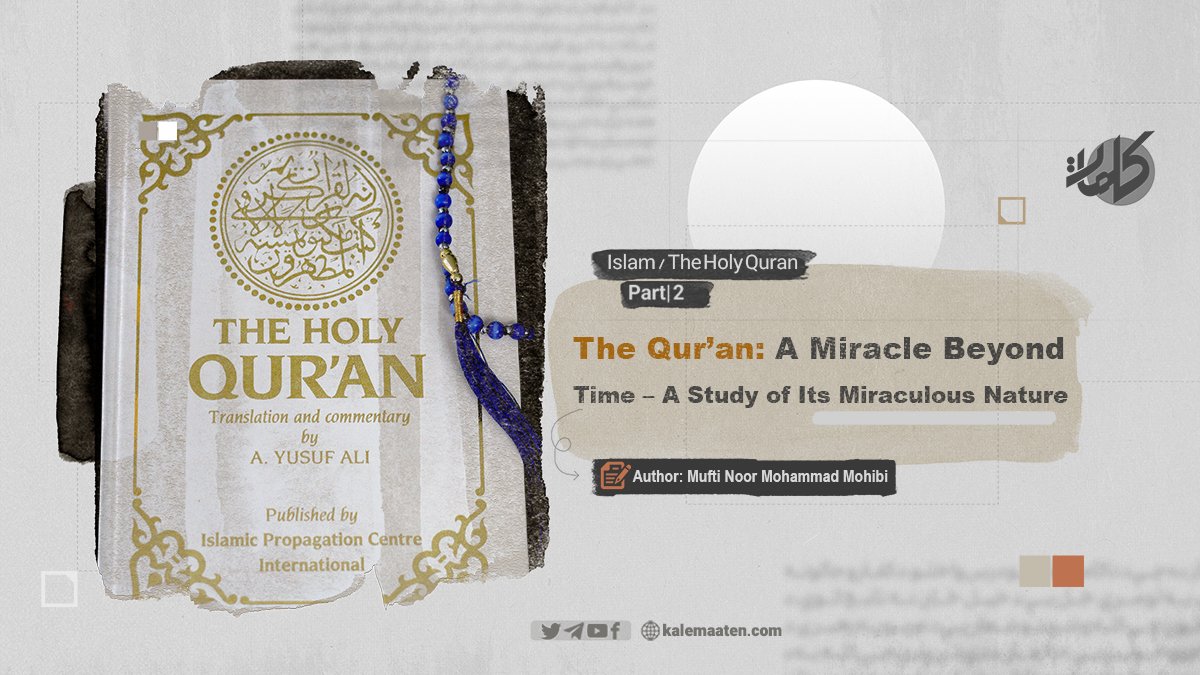
Author: Mufti Noor Mohammad Mohibi
The Qur’an: A Miracle Beyond Time-A Study of Its Miraculous Nature (Part Two)
The Importance and Necessity of the Science of I‘jaz (Inimitability)
Undoubtedly, Almighty Allah revealed the Noble Qur’an to His Messenger, Muhammad al-Mustafa (PBUH), as a guide for mankind in all dimensions of their lives, to lead them to the most upright path and the best course. This profound purpose is clearly understood from the following verse: “إِنَّ هَذَا الْقُرْآنَ يَهْدِي لِلَّتِي هِيَ أَقْوَمُ” [Al-Isra: 9] Translation: Likewise, this lofty objective is what a reader of the Qur’an first encounters in the opening chapter after Al-Fatiha, where it is stated: “ذَلِكَ الْكِتَابُ لا رَيْبَ فِيهِ هُدًى لِلْمُتَّقِينَ” [Al-Baqarah: 2] Translation: However, benefiting from the guidance of the Qur’an depends on the correct understanding of its meanings—and the path to that understanding is the science of Tafsir (exegesis). The realization of the primary goal of the Qur’an’s revelation, namely guidance, is only achievable through interpretation—an interpretation grounded in precise knowledge of abrogating and abrogated verses, the general and specific, the clear and ambiguous, the lawful and unlawful, and other fundamental concepts.
In a concise statement, the great scholar al-Zurqani (MABH) defines the science of Tafsir as follows:
“It is a science through which the Qur’an is studied in terms of its indication of Allah’s intent, to the extent of human capacity.”
Furthermore, since the Qur’an was revealed in clear Arabic, a deep and accurate comprehension of it is impossible without knowledge of the Arabic language, its structural features, vocabulary, and rhetorical styles. For this reason, the renowned scholar al-Tahir ibn ‘Ashur (MABH) emphasized: “The interpretation of the Qur’an does not reach its full and ideal goal unless it includes an explanation of the subtle aspects of rhetorical eloquence in the verse being interpreted, whether in detail or concisely, in accordance with the scholar’s intellectual capacity and effort.”
He goes on to criticize the neglect of this aspect in many commentaries, adding: “It is astonishing that most commentaries are devoid of addressing this noble purpose, except for a few distinguished ones, such as Ma‘ani al-Qur’an by al-Zajjaj, al-Muharrar al-Wajiz by Ibn ‘Atiyyah, and al-Kashshaf by al-Zamakhshari. Even some jurisprudential exegeses have considered this dimension in certain places, like Ahkam al-Qur’an by Ibn al-‘Arabi and Ibn Hammad al-Baghdadi (may Allah have mercy on them).”
Paying attention to the I‘jaz (inimitability) of the Qur’an is of utmost importance because it is the greatest eternal miracle of the Prophet (PBUH)—a miracle that has remained, and will continue to remain, a clear divine proof for the truth of Islam, not only at the time of revelation but throughout all ages.
As the author of al-Tahrir wa al-Tanwir emphasizes, there is an inseparable connection between understanding the Arabic language and grasping the true meanings of the Qur’an. This understanding is the very foundation for guidance, and such guidance itself stems from faith in the Qur’an’s miraculous nature.
In other words, there is a logical and philosophical relationship between I‘jaz and guidance: I‘jaz serves as a prelude to guidance. People follow evidence only when they are convinced of the reliability of its source. It is the I‘jaz of the Qur’an that provides the certainty and confidence necessary for accepting its guidance.
Hence, a scholarly focus on the aspects of the Qur’an’s inimitability—both generally and in detail—is one of the most crucial necessities of our time. Scholars of the past have also emphasized this point.
Qazi Abu Bakr al-Baqillani (MABH) said: “Among the most important matters that the people of faith must uncover, and the most essential subject requiring investigation, is what upholds the very foundation of their religion, supports the core of their monotheism, serves as a proof for the truthfulness of their Prophet (PBUH), and establishes the evidence of his miracle. This is especially necessary at a time when ignorance is widespread, hypocrisy is rampant, and knowledge is fading and vanishing.”
He adds: “It was most fitting that those who engage in Qur’anic sciences and its meanings would also clearly address the aspect of the Qur’an’s inimitability—because this is more critical than other grammatical and literary topics to which so much time and attention are devoted. The need for this subject is greater, and engagement with it is more necessary.”
In light of this vision, the scholars of the Muslim Ummah have always paid attention to the I‘jaz of the Qur’an, producing numerous valuable works on the subject. They firmly believe that exploring the Qur’an’s inimitability is a perpetual and inescapable duty of the Muslim Ummah.
Continues…


